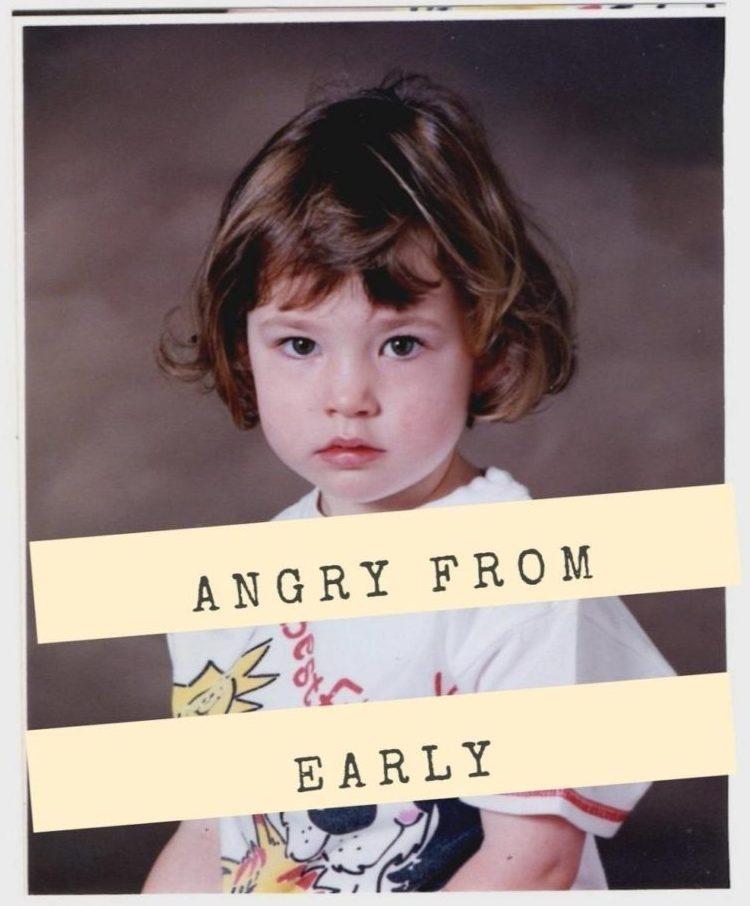
I have a vivid memory of running into my room following a pubescent argument with my parents – probably over, I don’t know, not coming home when I said I would or something – and releasing a silent scream from deep within my molten core, then hurling a remote control against the wall, sending its batteries flying and leaving a small nip in the plaster. Although inwardly embarrassed and shocked by my out-of-character physical outburst, I also remember immediately feeling better, as though the heat of my rage had melted from my skin, leaving behind only serenity and calm.
There have only been a handful of times where I can recall expressing, or even feeling, such pure anger (one of those times being punching my brother in the face as an adult, but that is a story for another day…), but I do find that when I have low mental health days, where I am not feeling myself and I can’t quite bat away feelings of anxiety and misery, I can express aggression and irritability towards the people I love most, unfortunately. Although less so nowadays, I have been known to say hurtful things that I don’t mean in order to insight a reaction, just so that I can draw in their attention, albeit in completely the wrong way. Selfishly, I’m thankful not to be the only one to have this problem.
The Mental Health Foundation says that more than one in ten (12%) people say that they have trouble controlling their own anger and 58% of people wouldn’t know where to seek help if they needed help with an anger problem, and they’re afraid that it seems that the problem is only getting worse. Societal changes and economic and political circumstances are contributing to an overall rise in emotional problems. According to researcher Carole Tavris: “The stresses of urban life are highly stimulating: frustration, noise, crowds, alcohol and sports do not instinctively generate anger, they generate physical arousal which, when coupled with a psychological provocation, can become the feeling of anger. Most of us don’t realise how often we are agitated by the background stimulants of our lives.”
Anger itself isn’t a mental health problem, let’s make that clear – it’s a normal part of life. However, anger can contribute to mental health problems, and can make existing problems worse. If you struggle to manage feelings of anger – like me – it can negatively affect your self-esteem, which can lead to you experiencing problems such as depression, anxiety, eating disorders or self-harm. Anger can also be a symptom of some mental health problems. For example, if you have an eating disorder, you might often feel very angry, and find it very hard to cope with such feelings. I know I did.
The charity Mind explains that anger only becomes a problem when it harms you or people around you, which can happen when you regularly express your anger through unhelpful or destructive behaviour, like punching your brother in the face, for example. When your anger is having a negative impact on your overall mental and physical health or if the way you behave when you feel angry is causing you problems in your life or relationships, it’s worth thinking about ways you can choose to manage anger, and learning about your options for treatment and support.
Last May, I quit my job in order to pursue my dreams of becoming an author and running Not Plant Based full-time. The sad reality is that becoming an author is a hardly financially stable initially (no shit Sherlock), so I’ve had to juggle a few side jobs, my most recent being working part-time at a local golf course. To tell you the truth, I love it. Golf, as you can imagine, is seasonal, so at the moment I spend most shifts with time enough to read and to have a go at whacking a few golf balls with a 7 Iron in the simulator room attached to the bar.
Did you think I’d be good at golf? Me neither. But turns out a few lessons from my dad when I was under the age of 10 were enough to equip me with a half decent position and the ability to wallop the balls an impressive distance for any beginner, I must gloat. After developing a taste for swinging (not that kind), I booked my first lesson, where it seemed that all the anxiety I’d been carrying throughout the week was released with every off-white bobbled comet that I sent flying into the net. It confirmed what I learned when I threw that remote all those years ago: Fuck it feels good to whack things!
Both my mom and Grandma used played golf regularly, a sport that is predominantly seen to be patriarchal. Without going into too much detail, my Grandma had mental health problems, like me, and although I was not close enough with her to talk to her about them, I like to think that golf may have been a release for her, and improved the state of her mind somewhat, at least when she played. But that’s not just based on my own hopes, a study from scientists at the Physical Activity for Health Research Centre at the University of Edinburgh, found that golf can improve both physical and mental health. Scientists analysed findings from 5,000 studies looking at associations between golf and wellbeing and found regular playing may prevent chronic illness, improve mental health and increase life expectancy. The researchers concluded that the physical aspects of golf could also help reduce the risk of anxiety, depression and dementia.
Lead scientist Dr Andrew Murray said: “Evidence suggests golfers live longer than non-golfers, enjoying improvements in cholesterol levels, body composition, wellness, self-esteem and self-worth.
“Given that the sport can be played by the very young to the very old, this demonstrates a wide variety of health benefits for people of all ages.”
If you’re still grappling with the concept of hitting things to make you feel better, allow me to introduce destructive therapy. It’s based on the idea that we find violent activities therapeutic, ‘violence’ being the exertion of physical force. Importantly, when it comes to this therapy, the violence is directed towards inanimate objects – not people, obviously. The British Association Anger Management says that if you’re not tempted by sitting in a circle and talking about your feelings, destruction therapy could be for you, as it’s a delicate psychological approach that puts you in touch with your feelings by getting you to smash things to smithereens. “When we smash something, we’re moderating our psychological state through the physical part of ourselves,” says Dr Michael Sinclair, director of City Psychology Group. This is possible because the four parts to the ‘self’ – emotional, behavioural, rational and physical – are all connected. Changing something in one of them has a knock-on effect on the others, he says.
Even in my home city of Birmingham a gaming centre launched a ‘Rage Room’, where customers can wield ‘indestructible Brooklyn baseball bats’ to smash everyday items to bits. I’m yet to visit, but I read that the goods lined up for destruction include pint glasses, beer bottles and food jars at £1 a pop, or you can opt for office items like keyboards and telephones for £5 each and a printer for a tenner. I’m sure my current remote control will be pleased to hear that.
Anger for most people generally isn’t a problem, and the majority of people will experience episodes of anger that are within a usual and healthy range. However, the Mental Health Foundation adds that “at the more extreme end of the range, anger can become entrenched in everyday life for some people, with destructive effects. Some people experience anger frequently and intensely, and it interferes with their thinking, feeling, behaviour and relationships, often creating misery for themselves and others. For this group, who might be described as experiencing ‘problem anger’, getting help could make a massive difference to their well-being, as well as the well-being of people around them.” If you are one of those people who really struggles with their anger, the first port of call for you would be a doctor – or someone medically able to treat you. For those who are looking for healthier ways of dealing with their own mild anger, a sport like golf could help you like it has done me.
The days of lobbing remote controls and hitting my siblings are behind me now, thankfully, so too are the days were I feel totally smothered by feelings of rage sparked by difficulties with my eating disorder. For me, it’s all about now trying to channel my demons in healthier ways, whether that be through a blog (hello!), a sport, or just spending some alone time in my garden with an old plate, a hammer, and some improvised armour.



